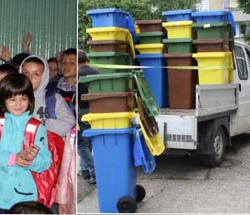| Main activities |
This project introduced primary waste selection in all schools in the border towns of Tuzla (SRB) and Užice (BiH) and raised the environmental awareness of the target population (pupils, teachers, cleaning and support staff from 14 elementary and 14 high schools), and indirectly the whole population of Užice and Tuzla, through joint educational and related activities.
The project systematically introduced primary waste separation in schools in two ways.
First, it established a system of information and education in all 28 participating schools through group information sessions, work of ecology sections, organization of quizzes and common eco-camps, and sharing publications.
Second, it provided technical preconditions so that the acquired knowledge can be adequately applied: waste bins are set in schools in a way to be accessible and easy to use; containers for collecting waste and temporary waste storage were set in front of the schools; container trucks for transporting the waste to centres for secondary waste separation in “Duboko” (Užice) and “Desetine” (Tuzla) were procured.
It also organised a promotional and broadcasting campaign about raising awareness about primary waste selection, including an opening conference in Užice and a closing conference in Tuzla. |
| Main results |
The synergy of theoretical and practical activities contributed to raising awareness and improving knowledge on the importance of waste separation, collection and treatment.
The main direct results of the project were as follows:
- Technical framework for primary waste selection created in 28 schools in Užice and Tuzla.
- Technical and human capacities of 2 Public Utility Companies for collecting, transport and primary waste selection increased.
- 112 employees in 28 schools prepared for primary waste selection management and support in schools.
- Primary waste selection concept implemented and promoted in schools in Užice and Tuzla.
- Local and wider communities presented with examples of good practice in primary waste selection in schools.
The project activities were implemented in 28 schools and subsequently introduced as examples of good practice that could be used and replicated within similar initiatives in any community in Užice and Tuzla. Thus, the clean working and living environment, as well as educational component introduced in the project had a significant positive impact on quality of life not only for all 20,000 pupils that were included in the process, but also for the other members of these local communities, benefiting 53,000 citizens of Užice and 117,000 citizens of Tuzla and the local governments of these two towns. |


